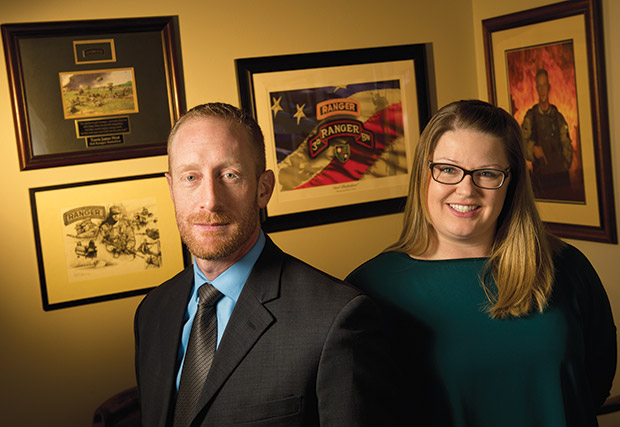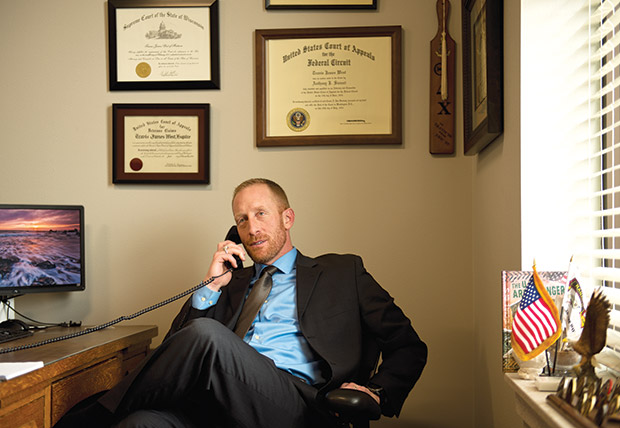IF I KNEW THEN: Veterans’ law attorneys shed light on practices
By: JESSICA STEPHEN//March 23, 2017//
IF I KNEW THEN: Veterans’ law attorneys shed light on practices
By: JESSICA STEPHEN//March 23, 2017//

Experience is sometimes called the ultimate teacher. Sadly, most people discover what they should avoid in life only after making mistakes and suffering the consequences.
Fortunately for those of us who would rather not learn every lesson the hard way, there is this thing called advice.
In this occasional series, “If I Knew Then …,” we ask experienced lawyers to share some of the best tips they’ve picked up over the years.
Today we offer insights for the practice of veterans’ disability law.
There are dozens of Wisconsin attorneys who have been accredited by the Office of General Counsel to deal with veterans’ disability claims.
But probably fewer than 20 are authorized to take those cases to the U.S. Court of Appeals for Veterans Claims, which has not only exclusive jurisdiction over Board of Veterans’ Appeals decisions concerning benefits but also the power to review those decisions if a veteran believes the board made a mistake.
“And that includes a number of attorneys we know who aren’t doing these cases anymore,” said Travis James West, a partner at West & Dunn who devotes nearly two-thirds of his practice to veterans’ benefits law. “So, it’s fair to say, less than 20. … It’s an area of law that seems to be a little bit inaccessible to a lot of attorneys.”
The accreditation requirement is not the only obstacle to pursuing this sort of practice. But, West said, that’s often where it starts.
“More often than not, what we’ll find is the lawyer will say, ‘This is just a law, like any other. I’ll represent you,’” he said. “And it isn’t until they get into it that they realize they need to be accredited.”
In fact, there are two levels of accreditation: one to practice at the administrative level and a separate admission at the court level.
Getting accredited isn’t all that arduous. As long as you’re able to practice law, you submit an application, meet a few continuing legal-education requirements and, basically, wait to be approved.
“Once you’re accredited you have to learn how the system works,” West said. “There are organizations out there and there are CLEs you can take, but it is, by and large, a trial-by-fire experience.”

Part of what must be learned — and accepted — is that veterans’ claims can take an extraordinary amount of time to adjudicate; decisions, on average, don’t come until three years after an appeal is filed.
“It’s very frustrating to start working within a bureaucracy that has no time constraints,” said Shana Dunn, the second half of West & Dunn in Waunakee. “The VA can almost literally take as long as they want until you get to the Court of Appeals, and that’s difficult for us to deal with in the beginning.”
That’s especially true if you’re trying to make a living.
“It can be five or six years before you see a dollar on a case,” said Jim Brzezinski, a partner at Tabak Law in Glendale, which is starting a new practice specializing in Social Security and disability appeals. “I went three or four years before I saw anything on my cases. Fortunately we had other practice areas to supplement and now some of these are coming to fruition.”
It also doesn’t help that, going all the way back to the Civil War, veterans have been discouraged from hiring lawyers to help them with their benefits claims. The government even limited the amount of money lawyers could make off such cases to $10 for every veteran served — all in an attempt to prevent unscrupulous practitioners from taking advantage of veterans.
“Whether those allegations were fair or not, they imposed monetary limits on the amount of money attorneys could charge veterans to help them with claims,” West said. “And, for 150 years, that stayed at $10 per veteran. Over the years it, effectively, became a bar to entry to seeking an attorney. You couldn’t make a full-time practice out of it.”
That rule was changed about 10 or 15 years ago.
As a result, West said, “You’re slowly starting to see attorneys filter into this area of law.”
Still, with all the barriers and difficulties, many don’t bother.
For those who do, there is often a personal connection.
West was a member of the U.S. Army’s 75th Ranger Regiment.
Dunn’s father was a Vietnam veteran. She also has other relatives who served in Vietnam and a grandfather who was in the armed forces after World War II.
Brzezinski also has relatives who were in the service. His grandfather was in Korea, his stepfather was a lifer in the Air National Guard, and he had uncles in the U.S. Navy and the Air National Guard.
“I always like to joke with my vet clients, ‘I’m not brave enough to be a vet,’ which is true,” Brzezinski said. “I’m definitely not the type of person you want in any conflict situation; I’m mild-mannered. But I’m persistent and I fight hard for clients. … And I feel like the vets just get walked all over. I like the idea of helping those who are willing to put it all on the line for us and pay it back that way.”
For years, Brzezinski was on the other side of the table, helping determine veterans’ benefits as a ratings specialist at the U.S. Department of Veterans Affairs. It might seem a strange experience for someone now in his line of work. But it’s in fact not especially uncommon.
Dunn, for instance, did essentially the same thing from 2001 to 2008, examining which veterans qualified for everything from home loans and vocational rehabilitation to health care and disability benefits.
Since becoming a veterans’ advocate, Dunn said, “Not a lot has changed for me; I do the same thing I did before, just from the other side.”
Dunn said that she finds a sense of satisfaction in her work that helps her push through bureaucracy and other stumbling blocks.
“It’s very rewarding to work with veterans,” Dunn said. “Most of them are indigent or very close to it. It does change their lives.”
There are also personal benefits.
“There are no midnight filings and, for the most part, you can take your time. You’re able to work at a decent pace,” Dunn said.
On the downside, there’s the uncertainty that comes from taking non-contingency-fee work and having to build a practice, West said.
“But it’s been a good experience,” he said. “It’s provided a different quality of life that I appreciate having, and there’s something about helping a population of people who really truly need the help.”
And, he said, “We have, over time, turned this into a full-service operation.”
The hardest part is often keeping up with various proposals that are almost always being floated as ways to mend the country’s support system for veterans.
“Every senator, every congressman, every advocate thinks they have come up with the right way to tweak the system,” West said. “And for the most part, those efforts are well-intended. But, as an advocate, it means you’ve got to stay on top of some fast-moving changes or you miss something that wasn’t available a month ago, a week ago, even a day ago.”
Unfortunately, he said, “… The more time I spend in this area, the more I come to believe there really isn’t a good fix. Certainly not one that will be painless or easy.”
Brzezinski shares that frustration, especially since the system often forces him to explain the seemingly inexplicable to disheartened veterans.
“These are nice people, but they’re angry,” Brzezinski said. “They’ve waited years, and they haven’t gotten what they’re after. And it’s hard when someone is mad at you. They think we’re not doing anything, but we have to wait our turn. And the worst thing is there’s really nothing for them while they’re waiting.”
Legal News
- Waukesha man sentenced to 30 years for Sex Trafficking
- 12-year-old shot in Milwaukee Wednesday with ‘serious injuries’
- Milwaukee man convicted of laundering proceeds of business email compromise fraud schemes
- Giuliani, Meadows among 18 indicted in Arizona fake electors case
- Some State Bar diversity participants walk away from program
- Wisconsin court issues arrest warrant ‘in error’ for Minocqua Brewing owner
- Iranian nationals charged cyber campaign targeting U.S. Companies
- Facing mostly white juries, are Milwaukee County defendants of color truly judged by their peers?
- Milwaukee Mayor speaks in D.C. Tuesday at White House water summit
- Chicago man sentenced to prison after being caught with ‘Trump Gun’
- FTC bans non-competes
- Gov. Evers seeks applicants for Dane County Circuit Court
WLJ People
- Power 30 Personal Injury Attorneys – Russell Nicolet
- Power 30 Personal Injury Attorneys – Benjamin Nicolet
- Power 30 Personal Injury Attorneys – Dustin T. Woehl
- Power 30 Personal Injury Attorneys – Katherine Metzger
- Power 30 Personal Injury Attorneys – Joseph Ryan
- Power 30 Personal Injury Attorneys – James M. Ryan
- Power 30 Personal Injury Attorneys – Dana Wachs
- Power 30 Personal Injury Attorneys – Mark L. Thomsen
- Power 30 Personal Injury Attorneys – Matthew Lein
- Power 30 Personal Injury Attorneys – Jeffrey A. Pitman
- Power 30 Personal Injury Attorneys – William Pemberton
- Power 30 Personal Injury Attorneys – Howard S. Sicula











